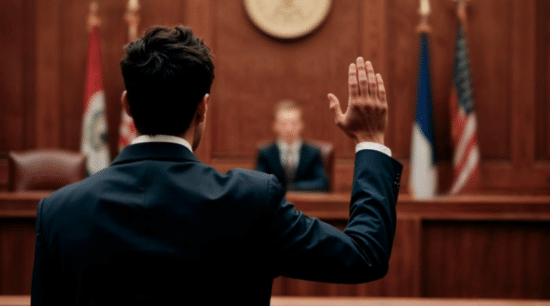Committing perjury can lead to a jail term of numerous years, depending on the jurisdiction and the matter under litigation. Other possible legal implications include probation and fines.
Besides criminal penalties, perjury may result in severe reputational damage. It can leave a massive dent on your credibility and cause you to lose future opportunities.
Jeffrey Archer’s case is a classic example of how lying under oath can have far-reaching implications. The English millionaire author and former politician received a jail term after being convicted on perjury charges, dealing the last blow to his once-flourishing political career.
The traditional way to challenge a litigant’s credibility is to confront them with contradictory evidence. And that’s where lie detector tests come in.
According to polygraph advocates, administering a lie detector test can help validate the veracity of a sworn litigant or witness’s statements.
Here are more insights into the role of polygraphs during perjury proceedings.
What Is Perjury?
Perjury is the crime of intentionally lying under oath. It’s also known as forswearing, and can involve both litigants (plaintiffs or defendants) and/or their witnesses.
Perjury is generally classified as a felony in most US jurisdictions. And while the offense is usually committed via speech, it may also be through writing.
In fact, perjury doesn’t only encompass crimes of commission. Wilfully withholding material facts during a legal proceeding may equally constitute forswearing.
But not everyone accused of perjury is guilty as charged. By administering a lie detector test, you can validate your sworn statements and uphold your credibility as a litigant or witness.
Polygraphs may not be 100% accurate. However, professionally conducted lie detector tests can have an incredibly low error rate. And where your life or reputation is on the line, this technique might spell the difference between proving your innocence and getting a wrongful conviction.

What Constitutes Perjury?
To be convicted of perjury, the prosecution must prove beyond a reasonable doubt that your sworn statements are false. Errors caused by memory lapse or genuine misunderstandings don’t typically constitute perjury.
Other key elements include;
a) Oath or Affirmation
For your statements to be perceived as false, you must have sworn to tell the truth in a legal proceeding. The affirmation may be oral or written.
b) Intentionality
Lying under oath isn’t sufficient. Prosecutors must establish that you deliberately engaged in a falsehood.
c) Relevance
The lies told must be relevant to the matter under litigation. Lying about immaterial facts is usually inconsequential, although it can still cast aspersions on your credibility.
What If I’m Caught?
There’s no honor in committing perjury. If convicted, you could be looking at a lengthy prison sentence.
As mentioned, the US federal law generally classifies perjury as a felony. The statute provides a jail term of up to five years.
Perjury may also lead to hefty fines. And even if you get off the hook, it can permanently dent your reputation and credibility.
But what if you’re wrongly accused of perjury charges?

Countering Perjury Accusations and the Place of Polygraphs
To prove perjury, the prosecution must offer contradictory evidence of the perceived falsehood. The alternative proof could be in the form of documented data, audiovisual recordings, or other parties’ sworn witness statements.
However, it’s not uncommon for prosecutors to misinterpret sworn statements as lies.
You could unintentionally tell a falsehood, perhaps due to a genuine mix-up of the facts or a mere Freudian slip. In that case, submitting to a lie detector test can help corroborate your statements and impeach the prosecution’s contradictory theory.
Conducting a Perjury Lie Detector Test
Polygraph tests are ideal when your credibility has come under intense scrutiny.
Let’s say the prosecution suddenly thinks you’re lying under oath because of a mere slip of the tongue. In that case, your attorney may recommend undergoing a lie detector test.
Be sure to understand the full implications of polygraph findings before giving your written consent.
If all looks great, your lawyer will seek the prosecution’s consent too. Both parties must agree for the findings to be legally binding.
Moreover, extensive preparation is key to the success of perjury lie detector tests.
An examiner will establish preliminary contact with you to walk you through expectations.
During these initial engagements, the polygrapher will confirm whether you still wish to go ahead with the lie detector test. They’ll especially underscore the significance of being calm and truthful throughout the process.
Note that polygraph results are subject to the attorney-client privilege. That’s to say, your lawyer reserves the right to disclose any lie detector findings.
What Happens To The Findings?
Most jurisdictions still do not allow polygraph testimony in criminal cases.
The findings are often applicable in civil litigations, with their admissibility still resting upon the presiding judge’s discretion.
Even with both parties’ consent, a judge or jury may still disallow polygraph evidence for lack of reliability.

Validating Litigant Statements Via Polygraphs
Despite the motivation, lying under oath can boomerang badly on you. But if you’re wrongly accused of perjury, taking a lie detector test can help prove your innocence.
Talk to your defense counsel about the implications of polygraph findings in the legal proceedings. Your attorney will help establish whether lie detector tests are legally admissible in your jurisdiction.
Next, they’ll consult with prosecution and the plaintiff’s counsel to persuade them to consider polygraph evidence.
If all parties agree, your lawyer will engage a licensed examiner. The examiner will conduct a lie detector test following industry guidelines, ensuring the most credible outcome.






